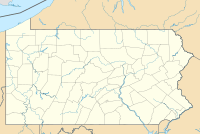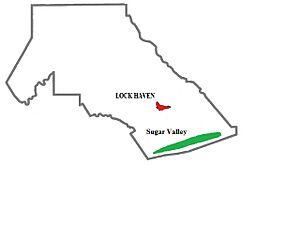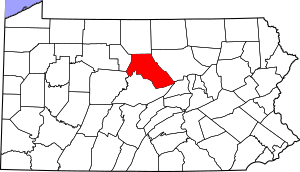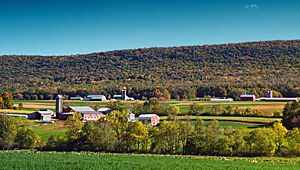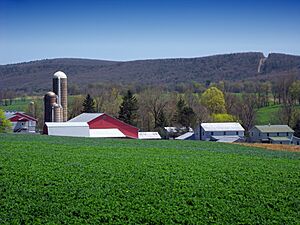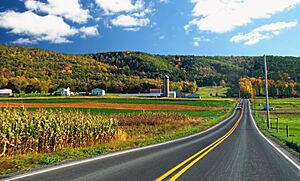Sugar Valley, Pennsylvania facts for kids
Quick facts for kids Sugar Valley |
|
|---|---|
| Length | 13 miles (21 km) northeast-southwest |
| Width | 1 mile (1.6 km) average |
| Geography | |
| Location | Clinton County, Pennsylvania, United States |
| Population centers | Tylersville and Loganton |
| Borders on | Sugar Valley Mountain (west/north) Nittany Mountain (east/south) |
Sugar Valley is a beautiful valley located in Clinton County, Pennsylvania, in the United States. It got its name because early settlers found many large Sugar Maple trees here.
The valley is about 18 miles (29 km) long, stretching from east to west. It is also about 2 miles (3.2 km) wide on average. Inside Sugar Valley, you'll find one main town (called a borough) and two larger areas (called townships). These areas have ten smaller communities within them. Each of these places has an interesting story about how it got its name.
Contents
Exploring Sugar Valley's Landscape
Sugar Valley is nestled between two mountains. On the southern side, you'll find Brush Valley Mountain. On the northern side is Sugar Valley Mountain.
Two main roads run through the entire valley. One is called the Winter Road, which follows Brush Valley Mountain. The other is the Summer Road, which runs next to Sugar Valley Mountain. The Winter Road got its name because the sun melts the snow on that side of the valley first. From above, Sugar Valley looks a bit like a canoe, with its sloped mountainsides leading down to a flat limestone floor.
A Look Back in Time: Sugar Valley's History
Here are some important moments in Sugar Valley's history:
- 1840: The town of Loganton (first called Logansville) was planned. Also, Logan and Greene Townships were created.
- 1842: The community of Tylersville was founded.
- 1861: The first company to provide water for Loganton was started.
- 1866: Booneville was established.
- 1874: The Logan Mills covered bridge was built.
- 1886: A community band was formed.
- 1899: The Bull Run one-room schoolhouse was built.
- 1906: Telephone services came to the valley.
- 1918: A big fire destroyed almost three-fourths of Loganton.
- 1946: The Sugar Valley Volunteer Fire Company was founded.
- 1955: The historic Bull Run school closed its doors.
- 1960: Interstate 80, a major highway, was built and runs through parts of Sugar Valley.
- 1972: Amish families moved into the community from the Lancaster area.
- 1990: Loganton and Sugar Valley celebrated their 150th anniversary.
- 2000: The Sugar Valley Rural Charter School was opened in Loganton.
Towns and Townships in Sugar Valley
Sugar Valley is made up of a borough and two townships, each with its own history and smaller communities.
Loganton Borough
Loganton was first known as Logansville, named after a Native American leader, Chief Logan. It was founded in 1840 and became an official borough in 1864. Its name was changed to Loganton in 1888 by the postal service because another town in Pennsylvania was already called Logansville.
Greene Township
Greene Township was formed in 1840 from Logan Township. It was named after Captain Harry Greene. He and six friends were killed in 1801 at the east end of Sugar Valley while chasing a group of Native Americans. This event was the last Native American massacre in Pennsylvania. A marker honoring Captain Greene was once located near Interstate 80 but has since disappeared.
Greene Township includes several smaller villages:
- Bull Run: This village was first called Sugar Grove because of all the sugar maple trees. It was renamed Bull Run because people believed buffalo used to cross the mountains here long ago.
- Carroll: Named after William Carroll, who ran a furnace in the area. Today, there are no longer any businesses from its past.
- Centerville: This name came from its location in the middle of the valley. Today, it's often called Schracktown because a local family farm owns most of the land.
- Eastville: Once called Princetown, its name was changed to Eastville simply because it's located at the east end of the valley.
- Rosecrans: Named after General Rosecrans, a Civil War general, by the local postmaster.
Logan Township
Logan Township was created in 1839 from Miles Township. It was also named after the Native American leader, Chief Logan.
Logan Township includes four smaller villages:
- Booneville: John and Ralph Boone named this town after themselves when they planned it in 1866.
- Greenburr: Originally known as Greenville because of the many green trees around, its name was later changed to Greenburr.
- Logan Mills: Colonel Anthony Kleckner founded Logan Mills. Like Loganton and Logan Township, it also got its name from Chief Logan.
- Tylersville: Founded in 1842 by Squire M.D. Rockey, he named the village after John Tyler, who was the President of the United States at that time.
How Many People Live Here?
Here's a look at how the population of Sugar Valley's main areas has changed over the years:
| Year | Logan Twp. | Greene Twp. | Loganton | Total |
|---|---|---|---|---|
| 1830 | 601 | --- | --- | 601 |
| 1860 | 832 | 1265 | --- | 2097 |
| 1890 | 941 | 1189 | 390 | 2520 |
| 1920 | 853 | 957 | 254 | 2064 |
| 1950 | 687 | 857 | 346 | 1890 |
| 1980 | 737 | 1002 | 474 | 2213 |
Fun Things to Do in Sugar Valley
Sugar Valley has many interesting places to visit and things to do:
- The Logan Mills covered bridge
- The Logan Mills grist mill (a mill for grinding grain)
- Sulphur Springs
- Visiting Amish communities
- Fishing in the local creeks
- Exploring the state forest and state game lands on the surrounding mountains
- Rosecrans Reservoir
- Schrack's farm
- Meyer's Dairy farm
- Tea Springs
- The Country Smoke Jam (a bluegrass music festival)
- Booneville campground
- Tylersville Fish Hatchery
- The Rosecrans Falls
- The historic Bull Run school
Famous People from Sugar Valley
- James Allister Jenkins: A Canadian-American mathematician who spent his summers east of Loganton. He was known for his work in complex analysis, a type of advanced math.
Images for kids
 | Isaac Myers |
 | D. Hamilton Jackson |
 | A. Philip Randolph |


